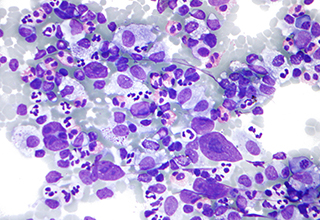Immunotherapeutic Use Expanded to Hodgkin Lymphoma
The U.S. Food and Drug Administration approval provides a new option for patients with the most common type of Hodgkin lymphoma

Use of the immunotherapeutic nivolumab (Opdivo) was recently expanded by the U.S. Food and Drug Administration (FDA) to include certain patients with Hodgkin lymphoma.
The expanded nivolumab approval means the drug can be used for patients with classical Hodgkin lymphoma that has relapsed or progressed despite treatment with an autologous hematopoietic stem cell transplant and post-transplantation brentuximab vedotin (Adcetris).
Hodgkin lymphoma is a relatively rare type of cancer. The National Cancer Institute anticipates that in 2016 there will be 8,500 new cases of the disease diagnosed in the United States and that 1,120 people will die of it. Classical Hodgkin lymphoma is the most common form of Hodgkin lymphoma diagnosed in the United States.
The approval of nivolumab for classical Hodgkin lymphoma was based on combined data from two clinical trials: the phase I CheckMate-039 and phase II CheckMate-205 trials. Among 95 patients with relapsed or refractory classical Hodgkin lymphoma who were treated with nivolumab across the two trials, 65 percent had partial shrinkage or complete disappearance of their tumors for a median of 8.7 months.
Given that the approval centers on response data, rather than overall survival, nivolumab’s manufacturer, Bristol-Myers Squibb, is required by the FDA to conduct a randomized, phase III clinical trial to confirm that the immunotherapeutic improves survival for patients.
Nivolumab works to release a brake called PD-1 on cancer-fighting immune cells called T cells. It is proving to be beneficial to patients with a wide range of cancer types: Hodgkin lymphoma is the fifth cancer type for which the FDA has approved nivolumab as a treatment option. It was first approved in December 2014 for treating certain patients with advanced melanoma. Then, in 2015, it was approved for both the squamous and nonsquamous forms of non-small cell lung cancer, as well as renal cell carcinoma.
With promising results reported at the AACR Annual Meeting 2016 from a phase III clinical trial testing nivolumab as a potential treatment for head and neck squamous cell carcinoma, it is hoped that the reach of this immunotherapeutic will be further expanded in the near future.
The FDA approval was rendered on May 17, 2016.
